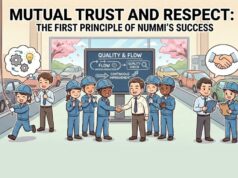By Adam Zak, Adam Zak Executive Search:
“Respect for people: Very few businesses start up only on the backs of the sole founder. It takes a team.” Jamie Flinchbaugh
Earlier this week, Jamie blogged about the Lean Entrepreneur. With layoffs mounting at even the Leanest Thinking companies, he argued that this might be just the time for “lean-minded” individuals to strike out on their own and start new businesses. In fact, some quick research I did indicates that 16 of the 30 DJIA (Dow Jones index) corporations were launched during past recessions, among them Microsoft, Hewlett-Packard, and Walt Disney, for example. Jamie makes a persuasive point.
And he's also on target writing that Lean Thinkers' clear focus on “customer obsession,” “direct observation” and “respect for people” can add tremendous value to the new venture. But I might have changed the order a bit and put “respect for people” first. So here's some additional perspective on the importance of the team – people – to the success of your new business undertaking.
In my earlier days, I spent some time in Silicon Valley helping start two companies, one which turned out moderately successful and was sold to a strategic buyer, and one which burned to a crisp and was eventually abandoned. These two experiences qualified me for a very small seat at the venture capital table, and I found myself assessing the viability of entrepreneurial ventures as they were brought to our attention.
I learned that, without question, the start-up team is absolutely the most critical element in the success or failure of a new company. Analyze carefully your own strengths and weaknesses and recruit others who can balance and complement these. Sure, it may be your brilliant idea for a phenomenal product or service, and you may be hesitant to share decision control, execution responsibility and eventual profits with others. But unless your business is high-powered consulting (think Deming, Drucker, Ram Charan, or James O. McKinsey – well, you get the picture) you are not likely to make the big time on your own.
It is very likely that you'll need 3-4 key team members, your co-founders, to help you get this thing off the ground. Each will bring his or her specialty to the venture: a boss (CEO); an idea guy (R&D, technology); a bean-counter/administrator (CFO or controller); and a chief sales rep (VP/Director Sales/Marketing). If you get the right people in place things like “who is our customer, what are we going to sell them, and how will we make it” have a way of getting figured out. That's what talented people do.
I know. You're thinking “Whoa, no way I can do this in the early stages of my new company.” Well, you may be right and you probably won't be able to recruit all the critical talent at once or at the start of your venture. But at some point you will need funding to build and grow your business, and the source (banks, angel investors, VCs, and the like), quality and cost of that funding will greatly depend on the excellent qualifications and credibility of the management team you've pulled together. Think and plan carefully.
Finally, a word about Boards. You may not need a board of directors right away but it wouldn't hurt to connect early on with some individuals who can help mentor you and your new venture in the right direction. Do you have family or professional colleagues who can provide a sounding board for your ideas? Perhaps non-competing industry professionals with strong leadership and management track records? Executives you've met through professional networking (LEI, SME, AME…) who can make solid introductions to functional managers within their own companies? Take advantage of these resources to build an informal “advisory board” or roundtable so you can benefit from their collective experience.
And then get on with it. As Jamie Flinchbaugh concluded,
“…if you find yourself in the unfortunate position of not having a job, maybe this is a time to take those lean skills in a new direction.”
I certainly think that might be the case. Adam Zak
If you’re working to build a culture where people feel safe to speak up, solve problems, and improve every day, I’d be glad to help. Let’s talk about how to strengthen Psychological Safety and Continuous Improvement in your organization.









Excellent points by Jamie and Adam. Some speakers and attendees at our just-concluded LEI Lean Transformation Summit made the related point that the current economic crisis presents big opportunities for companies that are truly lean not “fashionably” lean, as John Shook put it. – Chet Marchwinski